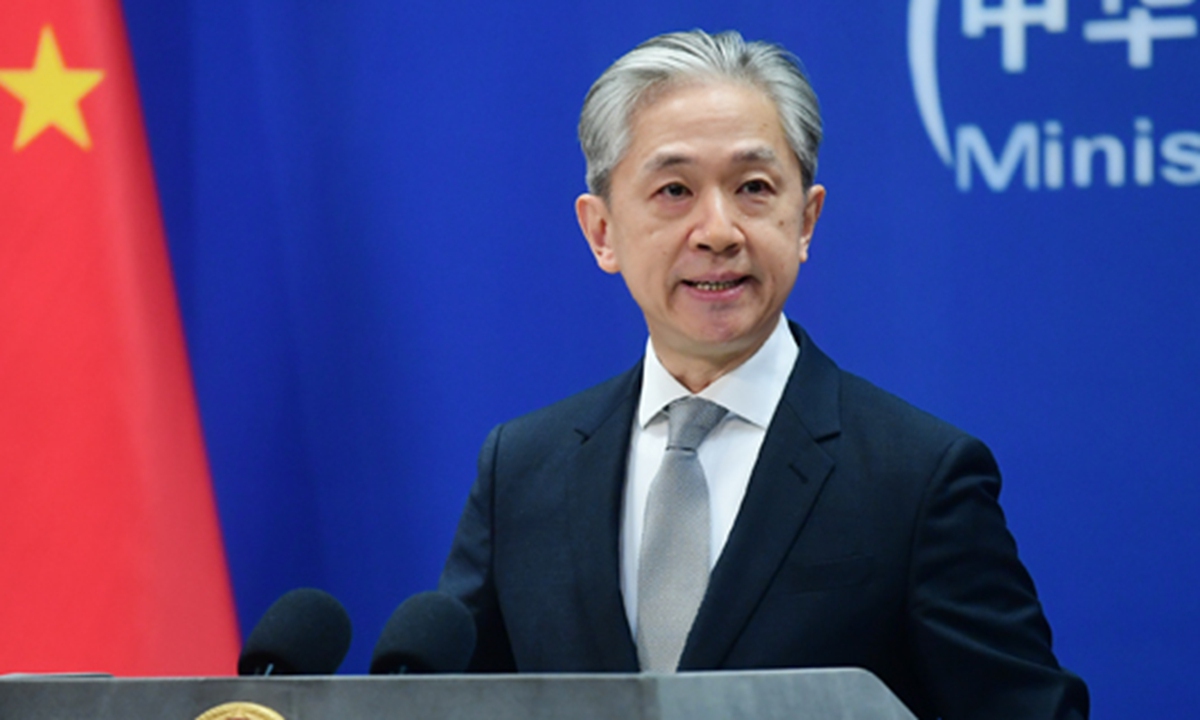‘Chinese spy’ hype in UK and Germany aimed at souring atmosphere of cooperation: FM spokesperson

Chinese Foreign Ministry spokesperson Wang Wenbin Photo: mfa.gov.cn
In response to accusations over "Chinese spies" by the UK and Germany on Monday and Tuesday, a spokesperson of the Chinese Foreign Ministry said that the so-called "Chinese spy threat theory" is not new in Europe, every time before or after China-Europe high-level interactions in recent years, there would be such a hype, with a clear intention of smearing and hitting China and souring the atmosphere of China-EU cooperation.
"Let me stress that China carries out cooperation with European and all other countries on the basis of mutual respect and non-interference in each other's internal affairs, and advances mutually beneficial cooperation with relevant parties in accordance with laws and regulations. We hope that relevant people in Germany will ditch the Cold War mentality and stop the political manipulation aimed at China with so-called "spy risks," spokesperson Wang Wenbin said at a press briefing on Tuesday.
Chinese analysts believe that the so-called Chinese spy allegations were made almost simultaneously by the UK and Germany, indicating possible coordination between the two countries, as it allows them to share the risks. Also the two countries may want to prove that the issue of so-called Chinese spies in Europe is not isolated but rather a widespread problem involving multiple countries.
German police arrested an assistant to a member of the European Parliament on suspicion of "especially severe" espionage for China, Reuters cited prosecutors as saying on Tuesday.
Reuters reported that a suspect named as Jian G. stands accused of giving the Chinese intelligence service information about negotiations and decisions in the European parliament, prosecutors said in a statement.
The media outlet reported that Jian G. was arrested the same day as three German nationals were arrested on suspicion of working with China's Ministry of State Security to hand over technology that could be used for military purposes. The three German nationals were arrested on Monday morning, according to The Guardian on Monday.
The arrests took place about a week after German Chancellor Olaf Scholz traveled to China to promote cooperation.
Often in China-Europe relations, when there is some progress at the political level, negative issues like the "Chinese spy threat theory" tend to arise, according to Chinese analysts.
There may be two reasons for this - first, some countries in Europe try to maintain a so-called balance on their China policy. With some forces in the countries holding negative sentiment toward China, countries always adopt a balancing or hedging approach in dealing with China, Cui Hongjian, a professor with the Academy of Regional and Global Governance with Beijing Foreign Studies University, told the Global Times on Tuesday.
Second, there may be a lack of coordination among different departments within these countries, Cui believes. For example, while the diplomatic or economic departments may want to promote cooperation with China, internal or security departments may have different ideas, indicating internal conflicts of interest.
From the current state of the German government, it seems the government is unable to fully control this situation, Cui noted.
British police on Monday also charged two men with spying for China, including one who is reported to have worked as a researcher in Britain's parliament for a prominent lawmaker in the governing Conservative Party, Reuters reported.
The Chinese Foreign Ministry spokesperson on Tuesday reiterated that "we would like to reiterate that the claim that China could be stealing UK intelligence is a groundless accusation and malicious smear, and we firmly oppose that accusation. Such malicious manipulation aimed at China should stop."
Cui warned that if European countries unilaterally pursue this approach that overstretches security concept, it will blur many boundaries in defining activities related to espionage or actions detrimental to their national security, turning accusations of "Chinese spies" into more of a political issue rather than a strictly legal one.
He noted that continuing in this manner will only make Chinese people feel more insecure in Europe, damaging normal interactions between the two sides.
This makes it difficult for China and the two European countries to engage in comprehensive, multi-domain, and candid exchanges, Cui warned.


